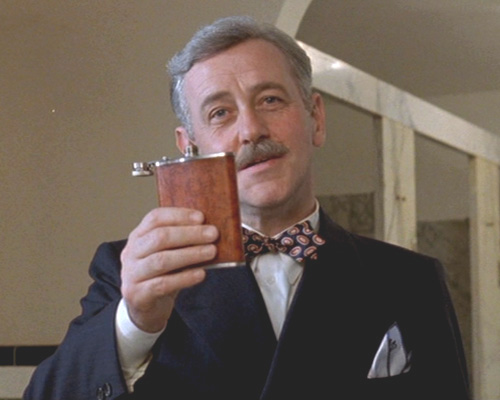AV CLUB: There’s a similarly loose resemblance between Mahoney’s character, a floridly boozy Southern author named W.P. Mayhew, and William Faulkner. Ethan Coen has acknowledged that discovering Faulkner had once worked on a wrestling picture starring Wallace Beery (Whaddaya need, a road map?) gave the brothers their way in on Barton Fink—the concept of an eminently serious author debasing themselves in order to, as Mayhew puts it to Barton, “make their way out here to the Great Salt Lick.” Like Faulkner, Mayhew is also a heavy drinker—Barton first discovers him puking in the bathroom—and he speaks in a casually baroque prose filled with references to the Bible and antebellum spirituals. Yet Cohen has also taken pains to say such similarities are “superficial.” Faulkner, like Odets, had his own reservations about the movie business, and he also expressed that contempt a bit more directly—and he had relatively less success in squaring them. At the same time, Faulkner also wrote dozens of short stories, along with some of his best novels, during and after his Hollywood tenure.
Mayhew, by contrast, is an august failure—a genteel mess, a drunk with dignity. Mahoney imbues Mayhew with courtly grace through the smallest of gestures; during his prolific vomiting in the bathroom stall, Mayhew kneels on a silk pocket square, which he then tucks back into his suit with a practiced flourish. “Sorry about the odor,” he says to Barton, with a warm conviviality. As he takes in Barton’s subsequent gushing over his novels, Mahoney gives Mayhew a tight smile that conveys both his inurement to fanboys and the slightest hint of shame at his own lapsed greatness. Mayhew is charming and wittily composed in the way that every boozehound fancies themselves. He even makes his alcoholism sound noble: “I’m buildin’ a levee,” he tells Barton later. “Gulp by gulp, brick by brick. Raisin’ up a levee to keep that ragin’ river of manure from lappin’ at my door.”
Mayhew somehow maintains that nobility even when he’s completely shit-faced. The punchline to Barton and Mayhew’s bathroom encounter, during which Mayhew invites him to come by his office later, is a smash cut to Mayhew bellowing inside his bungalow, with Mahoney giving Mayhew’s drunk voice a wounded and desperate tenor. In their rescheduled conference over a picnic, where the two discuss their differing approaches to writing—Mayhew, a beatific smile on his face, asks, “Ain’t writing peace?” while Barton contends it comes from “a great inner pain”—Mahoney gives his line a wistfulness that implicitly telegraphs just how far from that peace he is. He then drunkenly stumbles off with a droll suggestion of suicide, lashing out at Audrey while barking another purplish epigram—“The truth, my honey, is a tart that does not bear scrutiny!”—that’s just so much poetic nonsense. It’s all funny and pitiable, loathsome yet sad, and it lends some credence to Audrey’s tearful insistence that she really just feels sorry for him. “Empathy requires understanding,” she tells Barton as Mayhew wanders off howling “Old Black Joe.” MORE
_________

